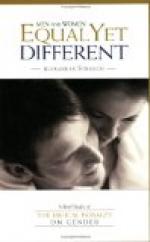It is argued by some that, if women would exercise the privilege of the franchise, she must be prepared to take the field as a soldier, or enter the navy, as circumstances might require, in time of war. History informs us that women have given valuable assistance in time of war, even taking the field and fighting nobly for their country when their valor was needed; and, in our own day, there is on record an instance of a woman commanding a vessel during a long voyage over exceedingly dangerous seas, and bringing it successfully into the desired port. But apart from this, the fact is, the argument is simply used as a bugbear to frighten the timid and deter them from claiming their just position, both social and civil. By law, certain classes of men are exempt from war, except in extreme cases, so that by no means all who vote, now, are expected to fight. Then, women render an equivalent to the State, and risk their lives in doing it, quite as much as soldiers or sailors; not, however, in destroying human life, but in perpetuating it. As recruiting agents, therefore, and the first drill-masters or instructors of the members of future battalions, they serve the Government as effectually as any standing army.
It does not follow, then, that as a consequence of being permitted to vote, or being admitted to other privileges, women must load the cannon or wield the sword. We wonder if the originator of such an attempt at intimidation ever heard of Joan of Arc or Margaret of Anjou.
It is claimed that women are unfit for public life because—another unproved assertion—they are incapable of reasoning logically or speaking fluently. Women have had but little opportunity afforded them for public speaking; yet, even with the slight advantages which they have possessed, they have proved themselves quite as capable of arriving at a high standard of reasoning or oratory as the majority of the opposite sex. Anna Dickinson will draw a full house in any city in the United States; and disinterested listeners (men) have pronounced her lectures unsurpassed, in close reasoning and power of fervid eloquence, by any male lecturer in the Union. But, say some, all women are not equally gifted; there are few endowed with the talents or voice of Miss Dickinson. Just so; and but few men are endowed with the talents of Theodore Cuyler, or gifted with the versatile wit of J.B. Gough; yet other men speak in public, and in their humbler sphere render the State good service.
The various Churches have not done what they might in drawing out this talent in women, and using it for the good of the world. Indeed, while quoting and straining the writings of the apostles to suit their own narrow views, those who have given tone to the various branches of the Christian Church, and virtually fixed the position of women therein, have wandered far, very far, from the practice of the Pauline days with regard to the employment of women in the public workings of the Church, as is shown by a comparison of the present working of the several Christian Churches with the sacred records, as given in Acts and the Epistles themselves.




